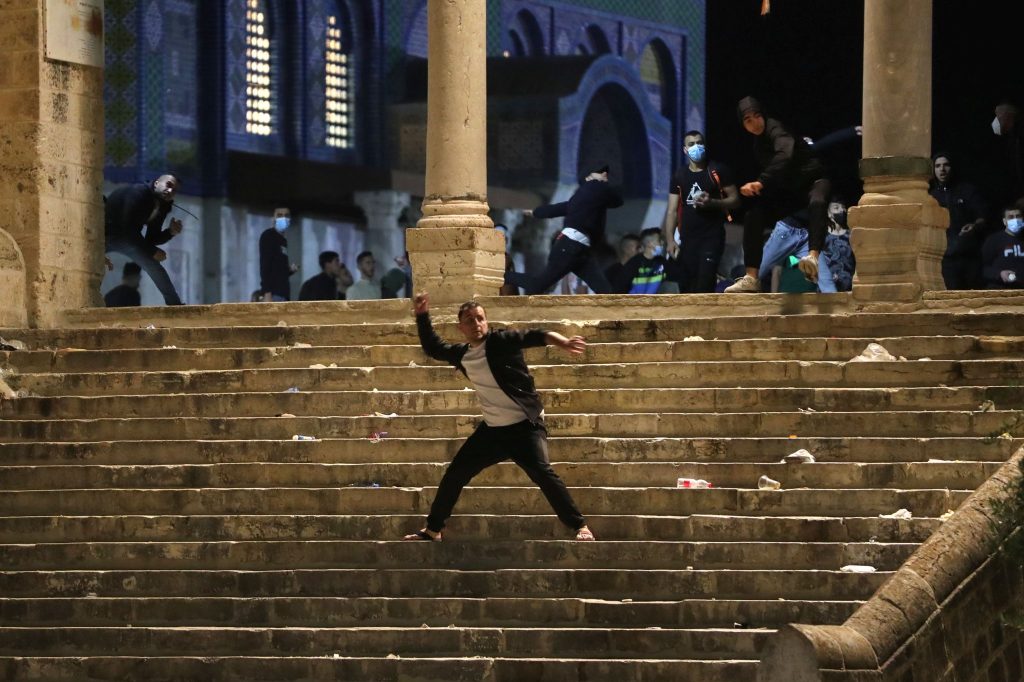Australia/Israel Review
The Last Word: When praying is a crime
May 5, 2022 | Fred Maroun

The Israel-Arab conflict is full of contradictions and astounding facts, but to an outside observer like me, nothing is quite as contradictory and bizarre as the situation on the Temple Mount, the Jews’ holiest site (known to Muslims as the Haram al-Sharif and their third holiest site).
On the Temple Mount, it is forbidden for Jews to pray. Yes, pray. No matter how quietly, and no matter how discreetly, Jews are not allowed to pray. In fact, it is forbidden for any religious group other than Muslims to pray on the Temple Mount.
It doesn’t matter that the Temple Mount is the site of the Jews’ First Temple destroyed by Nebuchadnezzar II of Babylonia in 587/586 BCE. It doesn’t matter that the Temple Mount is the site of the Jews’ Second Temple destroyed by the Romans in 70 CE. It doesn’t matter that forbidding prayer is a blatant violation of freedom of religion and freedom of thought.
And it gets more bizarre yet. This highly discriminatory rule was agreed to by Israel, the Jewish state, and it is enforced by the Israeli Police.
This agreement occurred between Israel and Jordan after the war of June 1967 during which Israel conquered east Jerusalem, including the Temple Mount.
On April 18, 2022, Jordanian Prime Minister Bisher Khasawneh issued a statement saluting rioters who are “hurling their stones in a volley of clay at the Zionist sympathisers defiling the Al-Aqsa Mosque.” How did the “Zionist sympathisers” do that, you might ask. Well, according to the Times of Israel, “Palestinian rioters throw rocks at Israeli buses en route to the Western Wall, as well as in the Temple Mount compound, in an attempt to prevent non-Muslims from touring the site.” In other words, mere Jewish presence on the holiest Jewish site constitutes “defiling” in the eyes of even Israel’s Arab peace partners, and violent opposition to that presence is seen as virtue.
Some Arabs try to rationalise their opposition to Jewish prayer on the Temple Mount by citing the fact that some rabbis believe that according to Jewish law, Jews should not enter the Temple Mount at all. A disagreement among Jews on Jewish law, however, is not for non-Jews to rule on, and it certainly does not justify violence against Jews.
From a moral point of view, the solution to this issue is simple. Anyone from any religion should be able to pray anywhere they want if they respect the rights of others to do the same. This is an internationally recognised fundamental human right.
From a realpolitik point of view, however, the solution is much less clear. The exercise of this fundamental human right by a small number of Jews angers Arabs, including pro-Israel Israeli Arabs and including Arab states who have signed peace agreements with Israel. To maintain internal peace and peace with its neighbours, Israel is forced to compromise even on the fundamental freedom of religion of its Jewish citizens.
On this fundamental issue of basic human rights for Jews, the Jewish state finds itself at the mercy of Arabs. This is ironic considering that Israel was meant to be the one place on earth where Jews are guaranteed equal rights with everyone else.
At the same time, the stubborn and sometimes violent Arab opposition to basic Jewish human rights is a reminder of why Israel exists. If Jewish rights are limited in the Middle East even within the Jewish state, one can easily imagine how much more limited they would be if Israel did not exist.
Fred Maroun is a Canadian of Arab origin who lived in Lebanon until 1984, including during 10 years of civil war. He supports Israel’s right to exist as a Jewish state, and supports the Palestinians’ right to self-determination in their own state. © Times of Israel (www.timesofisrael.com) reprinted by permission, all rights reserved.
Tags: Israel, Palestinians, Temple Mount






